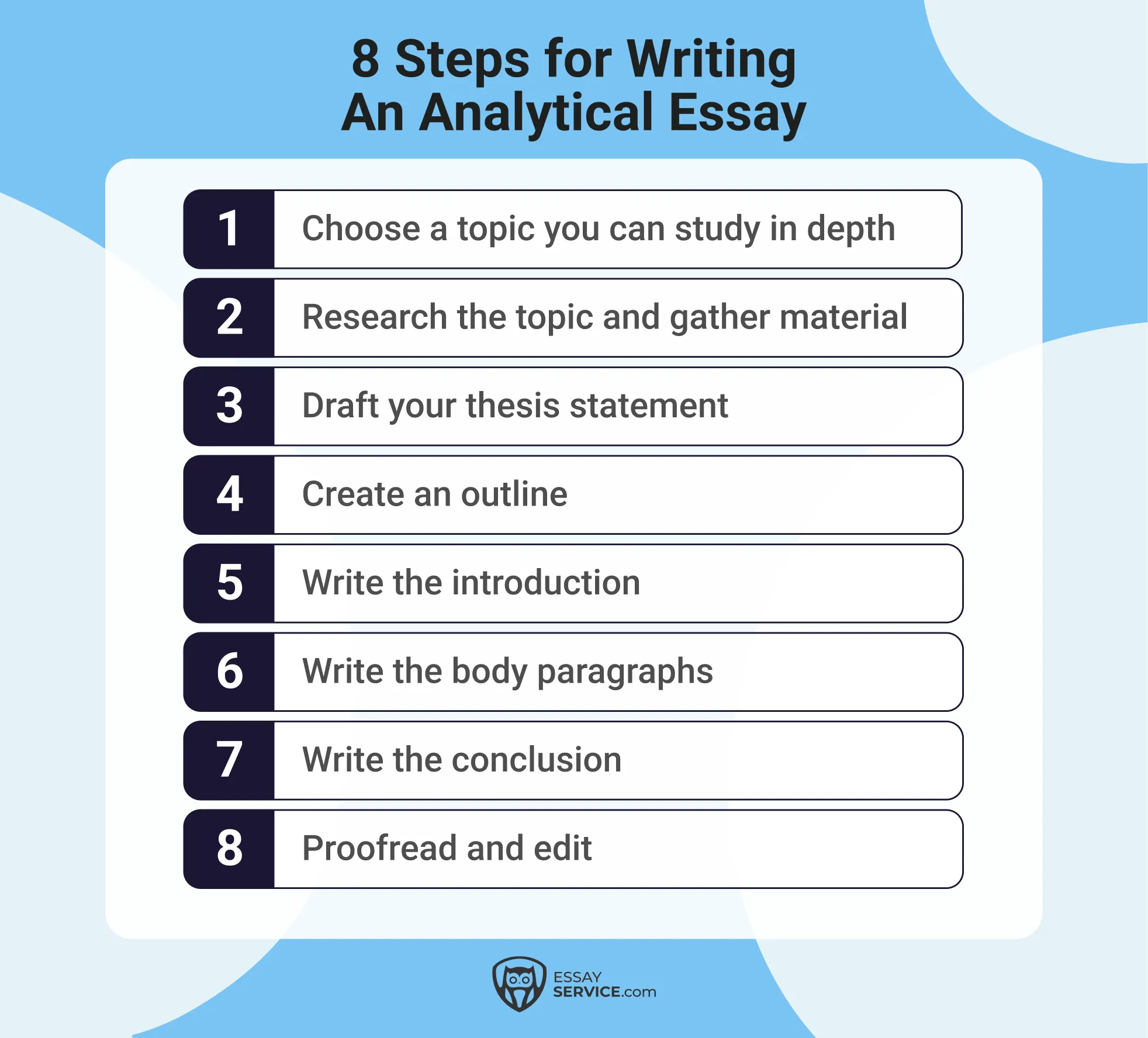Writing an analytical essay begins with a clear thesis statement that guides your main argument. Build the paper around focused body paragraphs that interpret evidence and show how each point supports your thesis. Create a brief outline, write an introduction that frames the topic, explain your ideas through structured analysis, and end with a conclusion that reinforces the meaning of your findings.
If you struggle with shaping your paper or keeping your analysis organized, you can turn to an essay writing service for support. EssayService offers guidance for any assignment and can help you move from scattered notes to a clear, well-structured analytical essay.
Analytical Essay Definition
An analytical essay is a piece of academic writing that examines a subject by breaking it down into parts and analyzing how those parts contribute to meaning. Instead of summarizing, the essay focuses on explaining how and why something works the way it does.
The purpose of an analytical essay is to help the reader understand a text, idea, event, or concept through careful analysis. This form of writing trains you to notice patterns, trace logic, evaluate evidence, and explain deeper meaning. It strengthens critical thinking because every point must be supported through structured reasoning.
An analytical essay can take several forms, including literary analysis, rhetorical analysis, process analysis, and critical evaluation of academic or media sources.


Need Real Writers You Can Trust?
EssayService connects you with human experts who craft clear, polished work.
Analytical Essay Structure
The analytical essay format has three core parts:
- an introduction that opens with a hook, offers brief context, and presents a clear thesis;
- a main body that develops the argument through focused paragraphs supported by evidence and analysis;
- a conclusion that restates the thesis and leaves the reader with a final insight.
If time is running short, you can turn to our custom essay writing service for guidance.
Introduction
When writing an analytical essay, the introduction should guide the reader into your main idea step by step. Start with a hook that relates directly to the text or topic. Then give a short amount of background information so the reader understands the context. End the paragraph with a thesis statement that explains the main argument you will prove in the essay.
Main Body
Each body paragraph of an analytical essay should follow a steady pattern so the reader can follow your argument. Begin with a topic sentence that states the point the paragraph will cover. After that, present evidence such as quotes, data, or examples taken directly from the text or source. Then explain the evidence with analysis, showing how it supports your main argument and why it matters. Conclude the paragraph with a brief mini-conclusion that reiterates the idea and connects it back to the thesis.
Conclusion
The conclusion brings the essay to a clear end. Restate the thesis in new words to remind the reader of the main argument. Then connect the key points from the body paragraphs to show how they support that argument. Finish with one final insight that explains why the analysis matters. This approach keeps the closure logical and strengthens the overall structure when composing an analytical essay.
How to Write an Analytical Essay in 8 Simple Steps
Writing an analysis essay starts with choosing a direction and picking material you can study closely. Once these early decisions are set, the writing feels easier because you know what the essay will explain and how the argument will unfold. Read the steps below to see exactly how to build the analysis piece by piece.

Step 1. Choose a Topic You Can Study in Depth
Good analytical essay topics allow close examination and interpretation. Ask whether the topic leads to a question you can answer through evidence, and check if the material has multiple angles.
For example, studying how one symbol functions in a novel gives you concrete passages to compare and interpret. That level of focus supports precise claims, clearer reasoning, and an argument built on specific textual evidence rather than general observations.
Step 2. Research the Topic and Gather Material
Research gives you the material your essay relies on. Strong sources help you spot useful ideas, clear patterns, and arguments worth developing. Facts add support, while passages and expert opinions give you something concrete to analyze. Each source becomes a tool for producing analytical essays with stronger reasoning.
As you read, you can track:
- Key ideas that appear often.
- Evidence that strengthens your interpretation.
- Short quotes you may analyze.
- Different viewpoints that shape the discussion.
A refined research trail also makes your referencing easier later, and EssayService’s guide on referencing supports that stage when you reach it.
Step 3. Draft Your Thesis Statement
Write a clear thesis once you start researching. The thesis is the main claim of your essay, so it needs to be specific, arguable, and strong enough to guide every section that follows. Base it directly on the text, data, or topic you’re studying.
- In literature, the thesis explains how a character, symbol, or theme functions.
- In social topics, the thesis explains how one factor influences another.
Sample thesis:
In The Yellow Wallpaper, the narrator’s changing behavior shows how forced isolation harms her mental health and alters her sense of identity.
Step 4. Create an Outline
Planning the essay helps the ideas settle into a structure that your reader can follow without confusion. Start by grouping the notes you gathered during research. Each group becomes a possible section.
A simple outline includes:
- Introduction: brief background and your thesis statement.
- Body sections: each point you will analyze, the evidence you will use, and a short note on what the evidence means.
- Conclusion: a place to restate your main claim and the bigger meaning.
Step 5. Write the Introduction
Open with a hook that creates immediate interest and signals the direction of the topic. You can use a brief image, a sharp claim, or a meaningful question. If you want ideas that make the process of writing an introduction for an analytical essay go smoother, EssayService’s guide on good hook examples offers useful inspiration.
Give enough context for the reader to understand the subject you are examining. Mention the text, issue, or material you will analyze, then guide the reader toward the central argument. End the paragraph with a thesis that brings clarity and direction. The introduction also benefits from a short hint about the significance of your analysis, because it prepares the reader for the deeper interpretation that follows.
You can structure the introduction like this:
- Hook: A line that catches attention and leads into the subject.
- Context: A brief setup that names the work, topic, or problem.
- Thesis: A clear analytical claim that guides the essay.
- Significance: A short note explaining why the interpretation matters.
Step 6. Write the Body Paragraphs
Begin each body paragraph with a topic sentence that sets the purpose and signals the point you plan to develop. The topic sentence creates the frame, and everything inside that frame should reinforce the claim you are making.
Use evidence with precision. Choose quotes, data, or descriptive moments that hold enough substance for close analysis. Then examine the evidence. Show what it suggests, how it deepens your argument, and why it deserves attention. Interpretation keeps the paragraph alive because it shows the reader how you are thinking about the material.
To keep each section clear and steady, you can follow this structure:
- Topic sentence: Establish the point you will analyze.
- Evidence: Bring in material that supports the point.
- Analysis: Explain the meaning, patterns, or implications.
- Connection: Link the insight back to your thesis.
Step 7. Write the Conclusion
Writing a conclusion for an analytical essay brings the discussion to a clear, thoughtful finish. Begin by restating the thesis in a new form so the reader sees how your argument has developed. Then guide them through the most important insights gathered from the body paragraphs. You can add a forward-looking element when the topic allows it, such as questions the analysis opens or areas that would benefit from further research.
A simple structure you can follow:
- Restated thesis: A refreshed version of your central claim.
- Key insights: A brief return to the strongest analytical points.
- Significance: A clear explanation of the value behind the analysis.
- Future direction: A suggestion that grows from the ideas you explored.
Step 8. Proofread and Edit
Look for grammar slips, missing words, and awkward phrasing. Read each paragraph slowly to check whether the flow makes sense from one point to the next. The reasoning should move in a straight line, without sudden jumps. Every quote, statistic, or example must serve a clear purpose, and the analysis must explain that purpose with precision.
You can use this checklist:
- Proofread carefully: Spot grammar issues, spelling errors, and missing transitions.
- Check clarity and flow: Make sure ideas move in a logical direction.
- Evaluate your evidence: Confirm that each source is well-analyzed and relevant.
- Refine phrasing: Adjust sentences so they sound natural when read aloud.
- Ensure consistency: Keep tone, style, and argument steady across the paper.
EssayService Helps You Write Smarter
Real writers improve clarity, tone, and flow in every draft.
Analytical Essay Template
This outline gives you a clear structure for planning your argument, arranging your evidence, and shaping your ideas into a logical sequence. Download it as a free guide or save it as a PDF to use while writing.
Analytical Essay Example
Please consider this free version of an analytical essay example PDF, which explores the multifaceted impact of technology on modern communication, highlighting its role in facilitating instant connectivity and access to information through platforms such as social media and messaging apps.
Conclusion
Learning how to write a good analytical essay is crucial for students because it helps develop analytical and critical thinking skills across various academic disciplines. Analytical essays require breaking down complex topics, evaluating evidence, and constructing coherent arguments, all of which foster a deeper understanding of the subject matter.
And whenever you need help with these types of assignments, EssayService’s analytical essay generator is available around the clock.
Frequently Asked Questions
What Is the First Step in Constructing an Analytical Essay?
The first step in constructing an analytical essay is to analyze the prompt. This involves understanding the assignment's specific requirements, such as the focus of the analysis, the type of evidence needed, and any guidelines for structuring the essay.
What Three Main Ingredients Are Essential Components of an Analytical Essay?
Three essential components of an analytical essay are a strong thesis statement, supporting evidence, and critical analysis. The thesis statement serves as the essay's central argument. Supporting evidence, including textual references, examples, or data, is used to validate and strengthen the thesis. Finally, critical analysis involves interpreting the evidence and explaining how it relates to the main argument.
Can You Use "I" in an Analytical Essay?
Using 'I' can detract from the academic tone of the essay and may weaken the credibility of the analysis. However, there may be exceptions, such as when providing personal reflection in response to a specific prompt or discussing your research methods or experiences as part of the analysis. Always follow the guidelines provided by your instructor or the assignment requirements.
What Is a Good Example for Analytical Writing?
A strong example of analytical writing appears in a paragraph that makes a clear claim, supports it with specific evidence, and explains the meaning behind that evidence. For instance, a student analyzing a novel might argue that a character’s repeated silence signals emotional withdrawal.
How Many Paragraphs Are in an Analytical Essay?
Many short analytical essays fall into a five- to seven-paragraph range, though longer assignments may require more sections. The structure usually begins with an introductory paragraph, followed by three or more body paragraphs. The essay closes with a concluding paragraph that ties the ideas together and reinforces the thesis. This layout gives you enough room to build a clear argument without overwhelming the reader.

Jennifer is a student currently pursuing a Journalism major. She oversees the EssayService blog team and uses her journalism skills to ensure all blog posts are accurate, trustworthy, and engaging.
- American Psychological Association. (n.d.). Asking analytical questions. Harvard Writing Center. https://writingcenter.fas.harvard.edu/asking-analytical-questions
- Cambridge Students’ Skills Development. (n.d.). Writing & analytical reporting. University of Cambridge. https://www.cambridgestudents.cam.ac.uk/skills-development/build-your-skills/categories/writing-analytical-reporting
- Professional & Digital Communication Program. (n.d.). GRE study guide: Analytical writing section. University of Wisconsin–Madison. https://pdc.wisc.edu/blog/gre-study-guide-analytical-writing-section/
New posts to your inbox
Your submission has been received!




.webp)